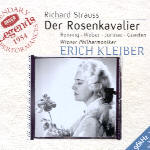Although Erich Kleiber’s 1954 Rosenkavalier was completed only months before Decca began recording opera in stereo, its monaural sound needs no apology. The mike placement strikes an ideal balance between voices (whether solo or ensemble) and orchestra, in contrast to many Decca mono operas where the singers are too closely miked. Those who have Decca’s 1990 CD transfer will want to know how this new remastering compares. There’s a more detailed, weightier orchestral image than before, with improved bass definition and note attacks. Added mid-range fleshes out the voices, but does so in a way that seems to make them more prominent in the mix, and equalized with less transparency than before. Kleiber plays the score complete.
Individually and collectively, the cast represents the Vienna State Opera’s postwar golden age at its finest. Sena Jurinac wears the trouser role of Octavian like a second skin, and Hilde Gueden’s Sophie remains unique for its silvery allure in the role’s higher range. Alfred Poell is one of the most memorable Faninals on record, while Anton Dermota sings the Italian Tenor’s solo with ringing authority. The cast’s veterans are Maria Reining as the Marschallin and Ludwig Weber as Ochs, one of his signature roles. Their deft interplay evokes the effortless sophistication of Noel Coward and Gertrude Lawrence. While the Vienna Philharmonic could play Der Rosenkavalier in its sleep, Kleiber clearly makes these players work for their schillings. For updated, sumptuous sound, Solti’s 1968 Vienna Rosenkavalier still rules among the opera’s uncut traversals (I hope Decca legends refurbishes this one too!). The true Rosenkavalier aficionado, though, will be glad to have Kleiber’s back in the catalog.
































